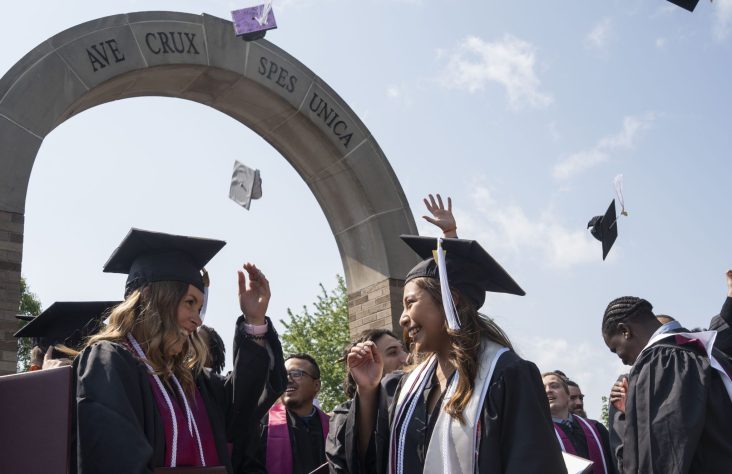November 17, 2015 // Local
Panel at USF discusses death penalty
By Madeleine Richey
FORT WAYNE —There’s a brightly lit stage, four chairs and four people to sit in them: a bishop, a philosopher, a law professor and a judge. They’ve gathered at the University of Saint Francis (USF) to hold a discussion about a very old institution that predates the birth of Jesus Christ and His subsequent death upon the cross, and has become one of the most controversial in current times — the death penalty.
Bishop Kevin C. Rhoades of the Diocese of Fort Wayne-South Bend, Dr. Earl Kumfer, professor of philosophy and theology at USF, Dr. Carter Snead, professor of law at the University of Notre Dame, and Judge Wendy Davis of the Allen County Superior Court criminal division, each bringing years of experience and beliefs deeply rooted in faith, begin the discussion. Should the death penalty be allowed and is it wrong?
“There are things I have laid my eyes on that I never want to see again,” says Judge Davis, speaking from her years of experience in which she bore witness to violent crime scenes. “I do believe, deep in my heart, that there are some individuals who cannot live in our society.” She is careful not to express support or condemnation of the death penalty — as a judge she is required to follow the rule of law, and, as Dr. Snead points out, the death penalty is not unconstitutional.
“I spend my time trying to persuade our fellow citizens that respect for human life is consistent with abolishing the death penalty,” Dr. Snead tells listeners, remaining steadfast in his belief that it is never morally permissible to punish a human being with death, and still uphold the unique dignity and respect for human life that the Church teaches.
Bishop Rhoades brings a historical perspective to Church teaching, saying that the Church, through the ages, has been consistent in allowing the death penalty so long as you are sure there is no other way of “defending human lives against the unjust oppressor,” meaning that self-defense is the only permissible cause.
According to Bishop Rhoades, capital punishment is not intrinsically evil. Death in forms such as abortion and euthanasia, which include the taking of an innocent life, are intrinsically wrong, but capital punishment does not include the taking of an innocent life so cannot be equated to crimes that do. In and of itself, there is no intrinsic evil to be found in the death penalty.
Dr. Kumfer brings up the practice of enacting the death penalty. In previous times, retribution such as “an eye for an eye” was standard, but Dr. Kumfer calls to light an inconsistency with this concept of balance, saying: “How are we balancing if we introduce another death?” In effect, two wrongs don’t make a right. However, the principle of double effect, in which an action has both a good and a bad result, is the only model, according to Dr. Kumfer, “that can be used to justify capital punishment.”
One of the dominant arguments against the death penalty states that capital punishment violates the dignity of a human person. However, Judge Davis brings up the quality of life for inmates without parole. Small cells with tiny windows, secluded for the safety of other inmates, shackled to keep officers safe in transit. … “I’ve seen with my own eyes trying to balance what dignity actually means,” Judge Davis tells her audience, to which Dr. Snead adds that in the case of dehumanizing conditions we must try to improve their circumstances, but can never accept the death penalty as the more humane option.
But for Judge Davis, it’s not just about the dignity criminals, but also that of the victim, and their right to justice. “What about the dignity of this human being?” she asks. Bishop Rhoades, however, reminds us that the Church must be concerned with mercy.
A general consensus among panelists, with their differing views on the death penalty, is that what is really being sought by the justice system and the families of victims, is closure. For some this means that the death penalty provides a way of keeping proven dangerous criminals from harming more innocent people, for others it offers only a false hope that this form of justice will somehow provide an end to the suffering.
“In my experience, there is more healing when the death penalty is not used,” says Bishop Rhoades. In other places in the world, he says, such as the Middle East, “There will never be peace because there is no forgiveness.” Getting even — restoring balance — is not enough. According to the teachings of the Catholic Church, there is no intrinsic evil in the death penalty, but often, Bishop Rhoades reminds listeners, “the death penalty does more harm than good.”
The best news. Delivered to your inbox.
Subscribe to our mailing list today.





